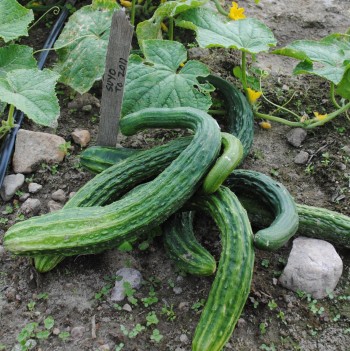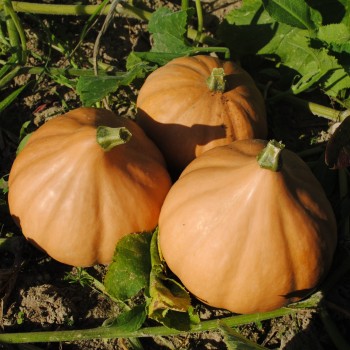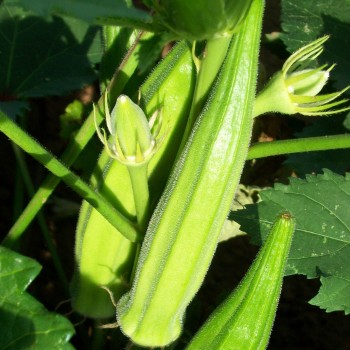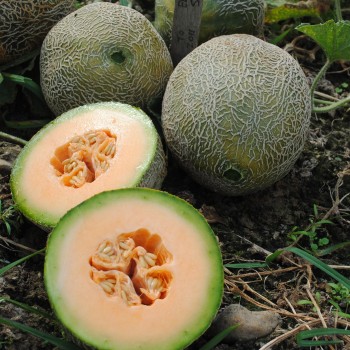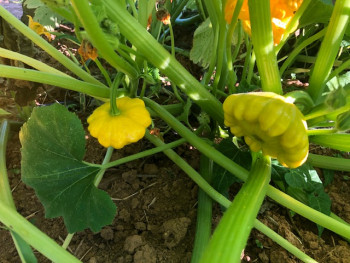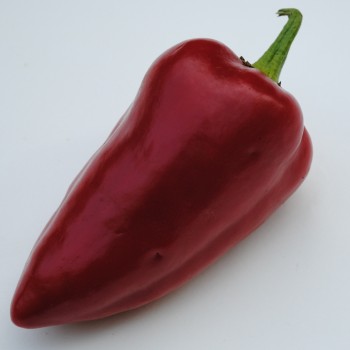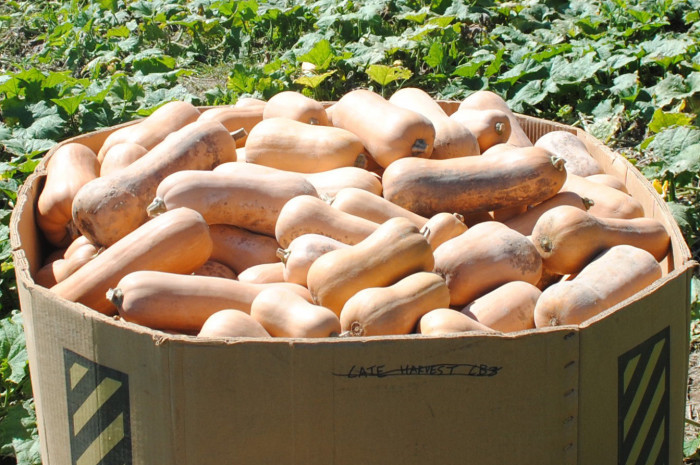
Tags: Certified Organic Open Pollinated
Growing Practices: No Pesticides No Herbicides No Fungicides No Synthetic Fertilizers
Latin Name: Cucurbita moschata
Days to Maturity: 120
Description:
High quality downy mildew resistant butternut squash bred for the South. Edmund Frost developed South Anna from a cross between Seminole Pumpkin and Waltham Butternut and has been selecting for over ten years for downy mildew resistance, eating quality, keeping quality, productivity, and general butternut shape. Exterior color is a deeper tan than most butternuts. The majority of fruits are 3-4 pounds, though they can range from 1.5-5 pounds.
In addition to its disease resistance and resilience, South Anna really stands out for eating quality. Brix, dry matter and flavor ratings have been consistently higher than other butternuts in our trials at Twin Oaks Seed Farm. They’ve become a staple at Twin Oaks Community, winning over even the most squash-skeptical community members with their consistently rich and sweet flavor.
We plant around June 1st. The plants are vigorous and fully vining and will grow strong till frost. For harvest, we recommend making two passes - one in late September, and the second right before frost, including fruits that aren’t quite fully ripe. These fruits will keep especially well into the winter and still have great flavor. Note that immature South Anna fruits start out both light and dark green. The dark green ones progress to a tan-and-green-stripe stage, while the light green ones go straight to a light tan stage. When fully ripe they’re all deep tan, but it’s useful to be aware of the two patterns when picking fruits that are slightly immature. Strong, vigorous, fully vining plants. 300 seeds/oz. Grown by Twin Oaks Seed Farm and Living Energy Farm.
These are Open Source Seed Initiative (OSSI) pledged seeds.
Please click the Common Wealth Seed Growers link to the right to view all of our other listings!
Questions 29 Total
Ask a Question About South Anna Butternut - Certified Organic (Pre-Order)
-
Answer this question
Will it grow in Manitoba, Canada (Zone 3)? Is the 120 day from seed starting or from the transplant date? I usually start them in peat pots 1 month before our last frost which is about June 1
Answers 1
-
We have gotten good feedback from Minneapolis and southern New England, but in general I don't recommend the variety for very far north. Its vigorously vining and in a colder climate can be slow to set fruit. -Edmund for CWSG
-
-
Answer this question
I just watched a video about South Ann butternut and i had to research more and it brought me to this page.Do you ship internationally?I am in the southern part of Africa where we actually have a long warm summer.I can grow them from september until winter sets in around May.So i am confident this can be a good money spinner.Given the right conditions how many butternuts on average can i get.I also read that you when you said it can produce 2 to 3 harvests.Do you mean it can make 2 or 3 cycles producing in the same season??Thank you very much.
Answers 0
-
Answer this question
How resistant is South Anna to squash vine borers?
Answers 1
-
We have vine borers, and I've never seen them affect the South Anna plants.
-Edmund for CWSG
-
-
Answer this question
Do you ship to the UK? I would love to try these Squash in our climate.
Answers 1
-
Hi, we don't generally ship to the UK, but maybe we can work something out - email commonwealthseeds@gmail.com. However, I am not sure whether the UK would have enough heat to do a good job maturiing this variety... Edmund for CWSG
-
-
Answer this question
Is the variety in color of immature fruit typical? Some dark green, variegated, and smooth; others almost white and slightly bumpy.
Answers 1
-
The immature color is variable - from very light green to dark green. .
-
-
Answer this question
When is the right time to plant it in the area that is along the coast like in Port St John's South Africa. And what fertilizer is suitable for
Answers 1
-
I'm not familiar with the climate there. Looks like its frost free all year? I would say to grow it at the same time you would grow other warm season vegetables, like tomatoes, peppers and cucumbers. I expect the vines of South Anna would last a long time there and you might go through and do 2-3 harvests. Fertility inputs of course depend so much on the situation and there are so many factors. I would just say you want nitrogen inputs to be neither low nor excessive, and you want the pH to be between 6 and 7.
-Edmund for CWSG
-
-
Answer this question
Grew this last year, near Philadelphia, PA. Amazing plant, one plant was over 80 feet long and produced about 2 dozen butternut squash. Still eating them, yum!
Answers 1
-
Really one plant producing 24 butternuts ......that is amazing.......10 plants would produce over 200 then....just wooow
-
-
Answer this question
I accidentally planted South Anna next to Seminole pumpkin. Literally bed to bed. Should I save seeds or purchase new? I had no issues with PM or borers at all here in 8B south of Atlanta GA. The squash beetles were on them but the plants outgrew them, so I didn't spray. I removed the plants from the field and burnt them so anything overwintering would be eliminated, mostly. Planted 1/2 acre and was sold out before December - the chefs raved about the South Anna with the brix and deep color. They tried the Seminole but greatly preferred South Anna, especially for making vibrant pasta!
Answers 1
-
Thats awesome - thank you for the feedback. Yeah you need to have the different varieties isolated by 1/4 - 1/2 mile in order to save seed that isn't crossed up. - Edmund
-
-
Answer this question
I’ve been growing this cultivar since Edmund first offered it years ago. It it is, far and away , the best tasting and most prolific of the moschatas I've ever grown. Here in Zone 5 Michigan, I no longer have tons of unripened squash sitting in the field. Waltham is awesome, too, but I seldom could get it to maturity. Thanks Edmund!
Answers 0
-
Answer this question
A comment here on my first crop of South Anna Butternut squash in the 2020 season. I had 42 plants and harvested 477 pounds of butternut. Planted them in may and harvested the last ones about mid Oct.. Had no problem with disease of any kind. They ranged in size from a few small to some 6 pounds. Most were 3-4 pounds. Had a great taste and keep well. March the 4th and still eating them. Plan to grow more this year and encourage any butternut grower to do the same. They do like to take over the garden. When i was taking the vines out i measured one that was 30 ft long. I am sure that many more were also.
Answers 2
-
How has your experience been with cucumber beetle, squash vine borer, and squash bugs? I don't use poisons, and these pests can be problematic with other squash. I am trying butternut because it's meant to have some vine borer resistance.
-
This answer is for "A Guy" from a question he asked me on 6/16/21. I am mostly organic, but not completely. Last year was the first time i sprayed my butternut squash to keep the squash borers and bugs, etc. off. I had been having a hard time getting my winter squashes to maturity because of the bugs and bores and powdery mildew. The South Anna are powdery mildew resistance and i dd not want to take a chance on the squash and borers so i sprayed them with chemicals. And had a very good harvest. There were about 50 more on the vines that had not matured when the frost came and killed them. Vines just kept growing and putting out.
-
-
Answer this question
I want to order for 2021, when will 2020 grown seed for Anna Butternut be available? Very excited to try. Downy Mildew is such a drag.....
Answers 1
-
Its available for purchase now, but we don't start shipping till January 7th. Thanks for asking. Edmund for CWSG
-
-
Answer this question
I don’t have a question, just an observation - this is hands down the BEST winter squash we have grown. From here on out we are not growing another variety. The production is great, the disease resistance is great, the fruit is beautiful, and they taste great. My only concern is that there is going to be a run on these seeds once the word gets out how good they are.
Answers 2
-
Thank you for this feedback!
-
You can save your seeds. I did from last year and they have come up real nice this year. Very good germination rate.
-
-
Answer this question
I transplanted my 2 week old South Anna butternut seedlings in late May. Does there come a time that a person should cut the ends of the vines to stop the vine growth so no more squash will develop that may not have time to mature, or pull off the new ones so all the energy of the plant can go to the ones that will mature.??
Answers 1
-
You can cut or train the vines if they are getting too big and running into spaces where you don't want them. This is not something that is common to do in field production however (except if you are doing a trial in which case its important to keep different plots or plants trained apart from each other). As for fruits that set too late in the season to mature - we often harvest and eat some of these as summer squash.They are sweeter and more flavorful than regular summer squash. Also I've heard that in Japan its common to remove late-setting fruits of winter squash. - Edmund for CWSG
-
-
Answer this question
I am growing the South Anna butternut for the first time this year. I started 42 seeds in trays and 41 germinated. Very good !! They are growing like crazy here in Tn. I have them on cattle panels. They have made it to the top and headed back down with side shoots everywhere. Trying to take over he world !!!! Looks like they are also putting on a good amount of fruit. I cannot tell how much with the abundance of growth and my rows being 7 ft apart it will be impossible to know for sure how many i will have until the vines die back in late summer, early fall. So far the vines are very green and all in all at this point happy that i am growing them. Expecting an abundant harvest !!!
Answers 1
-
Thank you for the feedback - I look forward to hearing more as the season goes forward, and after harvest. - Edmund for CWSG
-
-
Answer this question
Might the green (immature) fruits be used as a zucchini substitute? (Or, do you recommend another C. moschata as a vine borer resistant "zucchini?") Thank you.
Answers 1
-
Yes! I think they're sweeter and more flavorful than regular summer squash. - Edmund for CWSG
-
-
Answer this question
Thank You for letting me know that these South Anna Butternut seeds or for 2020. I just placed my order and looking forward to growing these for the first time this coming summer. Thanks again !!!
Alan FogleAnswers 0
-
Answer this question
I am ready to order my seeds for 2020. Are these South Anna Butternut seeds you are now offering grown for 2020. Thanks in advance for your reply.
Alan FogleAnswers 1
-
Yes, we are now selling and sending out South Anna seed that we grew in 2019 (started December 1st).
-
-
Answer this question
As i wrote to you in August of this year i plan to buy some of your South Anna Butternut squash seeds when you get them in. I plan to grow them in 2020 on a trellis. Will i need to use extra support like some kind of sling to hold the fruit up or will they hold themselves without breaking off the vine. I think they should hold themselves but would really appreciate your thoughts on the matter. Thanks !!! Alan Fogle
Answers 1
-
Yes, they will hold themselves on the vine. Make sure to use a large and sturdy trellis.
-
-
Answer this question
This is August the 12th, 2019 and i have just found out about your South Anna Butternut Squash and want to plant some next year. I am wondering if you will have seeds for next year saved from this years crop. If so i will wait until you get the fresh ones to purchase. I am looking forward to growing these as here in Tn. We have problems with the downy mildew and the squash vine borer and squash bugs and i read in a couple of the comments that they seem to be more resistant to them than many other squashes.
Alan FogleAnswers 2
-
Thank you for your interest. Yes we are growing and selecting a new crop this year so its best to wait till about mid December before ordering seeds for 2020.
-
George Vandenberghe College Park MD. I have slight to moderate squash vine borer issues but mostly grow butternuts which are, in my experience totally resistant. South Anna butternut is totally resistant to borers also in my experience. I did see some Downy and Powdery Mildew in September 2021 but whereas it caused 70% defoliation in my other large butternut area (I grow the huge 20 pound curved ones) and compromised the brix on these , the South Annas had less than 20% defoliation and kept growing and fruits were all fully nourished. I have not had problems with squash bugs on any of my squashes although they seriously damage my cantaloupes. I can also second the description that the flavor is REALLY good, much sweeter than healthy Waltham. Waltham does well planted early here but is unreliable as a late summer or fall crop. South Anna has borne reliably in fall the three years I planted it.
Executive Summary. North Anna is solidly resistant to Downy Mildew (as described in their description). All butternuts are solidly to totally resistant to Squash vine borers. South Anna flavor is indeed great.. as described.
-
-
Answer this question
Good evening. Are you planning to release the "8th year of selection" for your wonderful "South Anna Butternut"? Thank you.
Answers 1
-
Yes! This years growout is looking good and we are actively continuing the selection process.
-
-
Answer this question
Do you know if this variety maintains the vine borer resistance of Seminole squash? I live in New Orleans where I tend to lose all my squash plants to vine borers, and Seminole is the only variety I’ve had real luck with. Thanks!
Answers 3
-
I am not sure but would really love to know. We have vine borers here in Virginia, but my understanding is that they aren't at the kind of levels you see there. They do a lot of damage to our C. pepo and C. maxima squashes, but in our experience they don't touch the C. moschatas.
Edmund for CWSG -
Hi! Greg in Austin, Texas. Vine borers are definitely a problem here in Austin but this variety is unaffected. I've watched the moths flying in the morning and they will hover over the vines, maybe touch down but immediately fly away without laying an egg. By contrast I have picked hundreds of eggs off of our zucchini plantings.
-
Are you sure you have vine borers. They do live in Louisiana but a second boring insect, the pickleworm also lives there. Pickleworms tend to attack fruits later in the season while Squash vine borers attack the stems early and (second generation) late in the season. Pickleworms are not much of a problem in Maryland where I now live because they overwinter in Florida and south Texas and spread North every spring so I see a few in September but not in damaging numbers.
-
-
Answer this question
How long are the vines? Because my garden is small, I trellis all of my vining crops. But I learned the hard way that some squash vines can grow 50 feet long - way too long to trellis!
Answers 1
-
These have long vines. It would take a very strong trellis, such as a cattle panel arch. On the flat I use 9 foot row spacing. Don't be shy about training or cutting vines that are starting to go where you don't want them to.
Edmund for CWSG
-
-
Answer this question
hello, i would like to cross my tromboncino squash with your seminole x waltham (i'm looking for a long skinny squash that tastes like butternut when mature). i don't know the longevity of squash pollen, but if you'd want to send me some pollen, i would be more than happy to send you some F1 seeds back in exchange (if the pollen happens to survive the trip.) thanks!
Answers 1
-
I don't think the pollen would make the trip, though I've heard you can keep a male flower in the fridge for a couple days.
We have some seminole pumpkin that crossed with tromboncino accidentaly, so maybe I'll look into that, starting with some attempts at self pollination (its getting late in the season) and then some taste tests of the cross. I also have a couple seminole-waltham plants with long skinny necks that I could work with (if they do decently on eating quality tests).
Thanks for the offer and the idea. Edmund for cwsg commonwealthseeds@gmail.com
-
-
Answer this question
How many squash do I need to save seeds from to maintain genetic vigor in future generations? I have about 25 plants that are all doing great! Is that enough to maintain genetic diversity and strength or would it be beneficial to buy more seeds to plant next year alongside the seeds I save from this year? Thanks for such awesome seeds!
Answers 1
-
Elisha,
Since this is a variable population its ok to save seed from only your favorite few plants and to keep selecting from there each year to get (or maintain) what you want. (In a stable variety I would recommend at least 10 cucurbit plants but I think even then you can get away with less for a generation or two). Each Seminole-Waltham plant has a lot of genetic variation in it at this point. Also, each fruit has seeds whose male parents are many or all of the plants in the patch. Cucurbits do not have much inbreeding depression like corn or broccoli. In fact, many cucurbit varieties have been bred using repeated self pollinations of single plants (though many lines are tried during this process). This technique narrows the genetics much more than selecting from fruit that has multiple male parents. Some breeders believe that incorporating more plants and more genetics will yield a more resilient variety however. In any case if you're not self pollinating and you're saving seed from a few favorite plants there will be plenty of genetic diversity maintained here.
Edmund
-
-
Answer this question
Edmund, I am getting a good harvest. Some of the baby squash are dark green with butternut shape and some are light green with Seminole pumpkin shape. They are charging through Downey mildew that has killed the Waltham butternuts. Tromboncino and Palav Kudu are also not bothered by mildew. All other cucurbits are dead!
Answers 0
-
Answer this question
My first planting of these failed to germinate due to cool wet April conditions, Replanted May 9 and have 2 fruits both very dark green and looking like Seminole pumpkins, Just letting you know, no butternut shapes yet.
Answers 2
-
I now think I mixed these with another squash seed. Mine have classic young butternut coloration.
-
I now think I mixed these with another squash seed. Mine have classic young butternut coloration.
Further Internet research shows pics of the same dark green color in immature Seminoles so gues I will wait and see if they ripen to butternut tan. I'll say this, they have taken over the trellis going up 6', back down and over three rows!
-
-
Answer this question
Does Seminole Waltham winter squash need to to have something to climb up? And how much space between plants?
Answers 1
-
Two to three feet between plants and nine feet between rows.... While they will climb all over the place, they can be grown on the flat.
-
-
Answer this question
Is this seed the F3 from an F2 selection, or is it the F4 from an F3 selection?
Answers 1
-
This seed was selected from F2 generation plants in 2013. We planted and observed the F3 generation in 2014, and entered it in our winter squash variety trial. We have F4 seeds currently (selected from the F3 generation) but not enough to sell. Next year we should have F5 seed for sale (in bulk as well as packet sizes).
Edmund for CWSG
-
-
Answer this question
Do you have any more of this in stock? I want to order but can't because there isn't any in stock...
Thanks!Answers 1
-
Yes! I've updated the amounts.
-
Policies
Shipping Policies
We ship orders once a week on Friday, via US Postal Service. If you need expidited service we'll try to help - contact us at commonwealthseeds@gmail.com
Return & Refund Policy
Refunds are on a case-by-case basis. Please contact us with your concerns and we will be happy to be of service.
Common Wealth Seed Growers
Louisa, VA,
United States (Zone 7a)
Established in 2014
14.00
acres in production

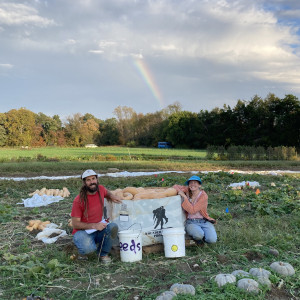 Posted by
Posted by 